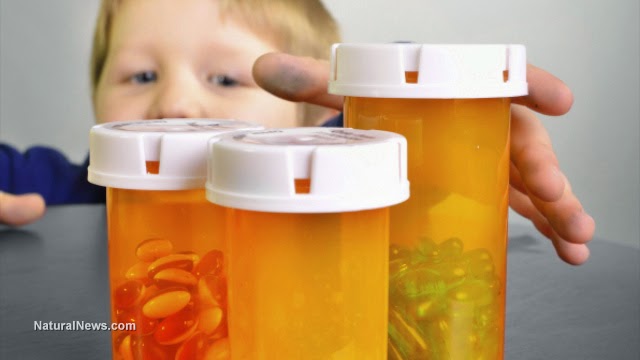When taxpayers aren't subsidizing all of this, government agencies and Congress are busy mandating what should be the very personal matter of choice, when it comes to parents' decisions about how to raise their own children.
That is the sentiment of Dave Hodges, host of The Common Sense Show, which is broadcast on more than 50 terrestrial radio stations, on satellite and via the Internet.
In a piece that he wrote for his show website, Hodges says "parents are sovereign over the welfare of their children, not the nanny state," but, "in the name of increasing the corporate bottom line" of Big Pharma, government agencies such as the Drug Enforcement Agency and the Food and Drug Administration, as well as "the office of the President," have all become "willing lap dogs" for the industry. The result has become "an unholy alliance" that serves mostly "to endanger our children."
'Big Pharma has gone to great lengths'
Continuing, Hodges notes, specifically, that certain medications are being pushed to the detriment of our kids:
Big Pharma has gone to great lengths to increase sales to the youth of America either through chemically castrating our children's brains or by producing drugs with very serious side effects which serve to seriously degrade both the brain and the body. Our children are being systematically destroyed by the pharmaceutical industry.
Particularly disturbing, he notes, is the dramatic rise in the use of psychotropic drugs, which work directly to affect brain activity that is associated with behavior and mental processes.
What's more, even the U.S. government -- the biggest pill pusher of them all -- knows that they can be dangerous. As Hodges points out, the Government Accountability Office (GAO) reported in 2011 that, though such medications "can have significant benefits for those with mental illness [NB: Natural News does not necessarily share that view], they can also have side effects ranging from mild to serious [a point we do agree with]." Some of those symptoms include drowsiness, loss of coordination, blurred vision, tremors and hallucinations. The worst of them - and one that is becoming increasingly common - is thought of suicide.
The GAO report was the result of a five-state study involving the rates at which kids in and out of foster care were given psychotropic drugs, via Medicaid, in 2008. Hodges discussed the GAO's findings in some detail:
According to the GAO, foster children in Florida, Massachusetts, Michigan, Oregon and Texas were prescribed psychotropic drugs at rates 2.7 to 4.5 times higher than children not in foster care. This gap may be because kids usually enter foster care after being abused or neglected and living through traumatic experiences. However, as a former clinician, I can unequivocally state that all factors can affect mental health and this does not warrant the wholesale medicating of our children.
Uncle Sam buys a lot of psychotropics
In 2009, Natural News reported on a study which found that kids in the United States were 300 percent more likely to be given psychotropic medications than kids in Europe. At the time, it was one of the first studies to measure psychotropic drug use.
"There is significantly greater use of atypical antipsychotics and selective serotonin reuptake inhibitor (SSRI)-type antidepressants for child mental health treatment in U.S. than in Western Europe," said lead researcher Julie Zito, of the University of Maryland's School of Pharmacy.
Specifically, the team examined the number of prescriptions involving psychotropic stimulants, such as Ritalin, and antidepressants like Prozac, that were prescribed to more than 600,000 people under the age of 20 in the U.S., Germany and the Netherlands between 1999 and 2000.
"They found that 6.7 percent of children in the United States, 2.9 percent of those in the Netherlands and 2 percent of those in Germany were taking at least one psychotropic drug at the time," Natural News reporter David Gutierrez wrote at the time.
Not much has changed in since then, except that the government is a bigger player now.
Author Bio: Linda is a freelance writer and college
English teacher. She writes on saving money and healthy, fashion and more. For
more of her helpful blog posts, please go to coupon4share.com or G+
to see useful tips on various topics
Source: http://www.naturalnews.com/

No comments:
Post a Comment